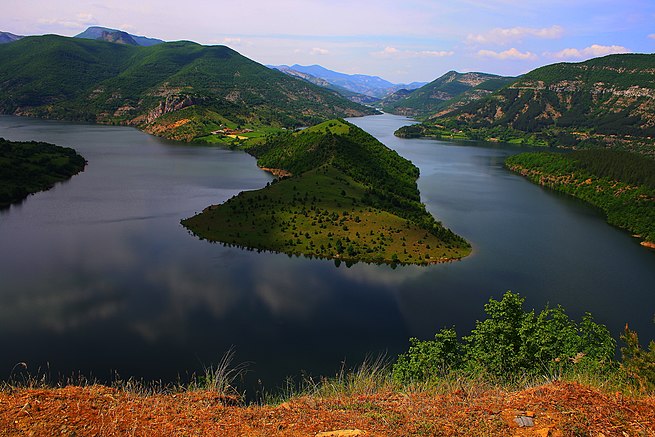
Main Difference
The main difference between Reservoir and Pond is that the Reservoir is a artificial lake for storing water; usually means an enlarged natural or artificial lake, storage pond or impoundment created using a dam or lock to store water and Pond is a body of standing water, either natural or man-made, that is usually smaller than a lake
-
Reservoir
A reservoir (from French réservoir – a “tank”) is, most commonly, an enlarged natural or artificial lake, pond or impoundment created using a dam or lock to store water.
Reservoirs can be created in a number of ways, including controlling a watercourse that drains an existing body of water, interrupting a watercourse to form an embayment within it, through excavation, or building any number of retaining walls or levees.
Defined as a storage space for fluids, reservoirs may hold water or gasses, including hydrocarbons. Tank reservoirs store these in ground-level, elevated, or buried tanks. Tank reservoirs for water are also called cisterns. Most underground reservoirs are used to store liquids, principally either water or petroleum, below ground.
-
Pond
A pond is a body of standing water, either natural or artificial, that is usually smaller than a lake. They may arise naturally in floodplains as part of a river system, or they may be somewhat isolated depressions (examples include vernal pools and prairie potholes). They might contain shallow water with marsh and aquatic plants and animals. The type of life in a pond is generally determined by a combination of factors including water level regime (particularly depth and duration of flooding) and nutrient levels, but other factors may also be important, including presence or absence of shading by trees, presence or absence of streams, effects of grazing animals, and salinity.
Ponds are frequently human-constructed. In the countryside farmers and villagers dig a pond in their backyard or increase the depth of an existing pond by removing layers of mud during summer season. A wide variety of artificial bodies of water are classified as ponds. Some ponds are created specifically for habitat restoration, including water treatment. Others, like water gardens, water features and koi ponds are designed for aesthetic ornamentation as landscape or architectural features. Fish ponds are designed for commercial fish breeding, and solar ponds designed to store thermal energy. Treatment ponds are used to treat wastewater.
Standing bodies of water such as puddles, ponds, and lakes are often categorized separately from flowing water courses, such as brooks, creeks, streams or rivers. Nutrient levels and water quality in ponds can be controlled through natural process such as algal growth, or through artificial filtration, such as an algae scrubber.
-
Reservoir (noun)
A place where anything is kept in store
-
Reservoir (noun)
A large natural or artificial lake used as a source of water supply.
-
Reservoir (noun)
A small intercellular space, often containing resin, essential oil, or some other secreted matter.
-
Reservoir (noun)
A supply or source of something.
-
Reservoir (noun)
A species that acts as host to a zoonosis when it is not causing acute illness in other susceptible species.
-
Pond (noun)
An inland body of standing water, either natural or man-made, that is smaller than a lake.
-
Pond (noun)
An inland body of standing water of any size that is fed by springs rather than by a river.
-
Pond (noun)
The Atlantic Ocean. Especially in across the pond.
“I wonder how they do this on the other side of the pond.”
“I haven’t been back home across the pond in twenty years.”
-
Pond (verb)
To block the flow of water so that it can escape only through evaporation or seepage; to dam.
-
Pond (verb)
To make into a pond; to collect, as water, in a pond by damming.
-
Pond (verb)
To form a pond; to pool.
-
Pond (verb)
To ponder.
